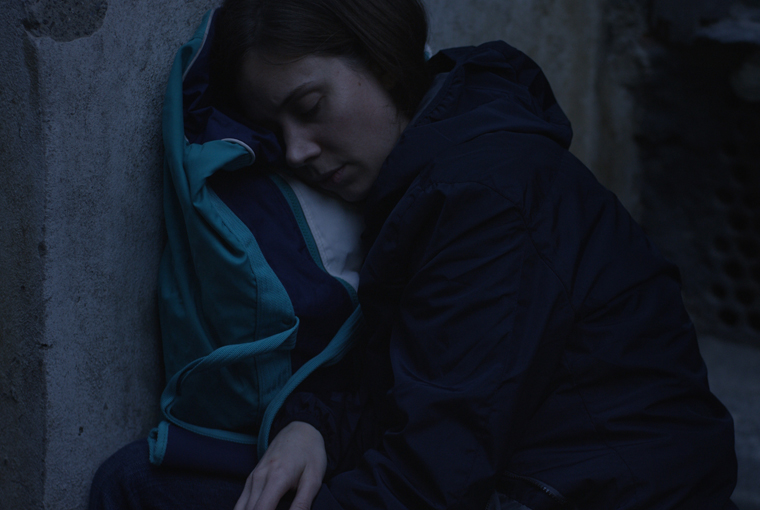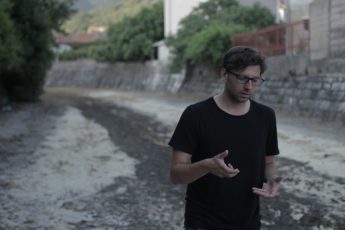A Loose String of Beads
Ivan Salatić’s You Have the Night (Ti imaš noć, 2018)
Vol. 90 (December 2018) by Konstanty Kuzma
A young woman returns to her hometown in Montenegro where she left behind her son, and a community on the brink of economic collapse. Though a good part of Ivan Salatić’s The Night is Yours unfolds as a close-up portrait of Sanja (Ivana Vuković), who is seen bonding with the reclaimed child, and its father, her fate is essentially forgotten as Salatić turns his attention towards the town and its cross-generational troubles following an inexplicable volt in the film’s last third. This leaves the film clumsily poised between personal drama and city study, exacerbating the looseness of a film already dangerously half-driven by atmospheric vignettes and light drama.
As if to set up this string of beads narrative, the film opens on a ship far off Montenegro where Sanja works as a cleaning lady. In one of the first aesthetically worrying encounters with our protagonist, Sanja’s co-worker shares her memories and dreams with her. Though the scene is anything but daring – the co-workers are slumped over the phone, exchanging perfectly banal small talk -, the acting is unworthy of Vuković’s otherwise decent performance. In Italy, where the journey soon makes its first stop, we briefly follow Sanja as she roams the streets of a nondescript city. Upon spending the night on the street, we watch her being admitted to a women’s shelter in a long scene featuring a barely helpful translator. This lengthy prologue appears to do no work besides introducing us to Sanja’s economic situation and setting up the theme of the sea as an open space that harbors both promises and dangers.
Luckily, Sanja’s hometown Bijela soon enters the picture, and with it some much-needed relief from the aimless wondering – if only for the fact that the film’s setting stays put. Rather than literally having us jump from one location to another, the camera now dwells on the local patriarchs discussing life and politics in Montenegro’s forgiving climate, which perfectly fits Salatić’s meditative style. Ultimately, however, the denouement of Sanja’s personal story throws away whatever narrative gains were made by physically constraining the film to one place.
The main issue with Salatić’s predilection for loose narrative is the fact that the individual sequences don’t even work very well in themselves. Like the co-worker who shares her childhood recollections with Sanja only to disappear from the story, most characters don’t get enough screen time to evolve into relatable human beings. To some extent, this seems to be a problem of directing, although it is also one of choice, as Salatić seems to have a lot of fate in his semi-conventional aesthetics. Though many of the visual sequences dwelling on the surroundings of Bijela are genuinely captivating, they hardly make up for the time they take away from the film’s underdeveloped characters.
To be fair, there are two characters besides Sanja who capture the viewer’s attention almost as soon as they enter the scene: Sanja’s brother Luka, played by Luka Petrone, who has collaborated with Salatić in the past (which seems to the basis for his strong albeit laconic screen presence), and the child’s father, who lives separately with his own family but reestablishes a working relationship of sorts with Sanja following a powerful sex scene. Presumably, the relationship between Sanja and the child’s father is where the drama was supposed to reside, as we watch watch the two converge and part over residual tensions and emotions, and the fate of the child, whom Sanja wants to take abroad. The elephant in the room is the town’s dock, however, which was once the region’s pride but has since degraded into a ruin. The film closes on a view of the so-called “Small Dock” – which is in fact a massive mobile construction – floating off-screen to the sound of warning sirens.
To a town like Bijela, the definite closing of the dock constitutes a decisive and potentially tragic moment of history, although this is really only evident from some expository dialogs and radio announcements that keep disrupting the illusion of pastoral idyll. When one of the village elders augurs what awaits him and the young generation once the dock is gone, the last hope for authentic drama has passed. Though believable moments of village life are scattered throughout the film, its narrative spine is too faint to stem the weight of a multi-character study. Time and again, we switch from Sanja’s perspective to that of the child’s father or a village elder and back until we feel that it does not matter either way. Here is a movie based on a fair premise and an authentic story that is unable to cash in on its ideas. Presumably, the dock was supposed to bring together all the strings in Salatić’s universe, though it is curious why Salatić would have chosen Sanja as his point of entry. If her repeated escape attempts symbolize Bijela’s plight, they do so in a purely negative way. No attempt is made to link Sanja’s identity to that of the film’s setting – a disconnect best symbolized by a random archival sequence which disturbs the narrative flow at potentially key junctures. Unlike the village elders, Sanja does not pine for Bijela’s golden days; hers is the fate of an uprooted generation that is unable to feel nostalgic about white-and-black images of a past long gone. Why make us identify with Sanja when the main theme of The Night is Yours is a time and place she does not feel attached to?


Leave a Comment